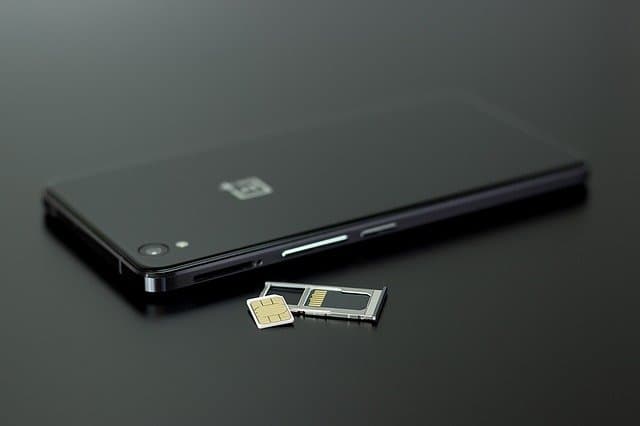Your computer uses a firewall and antivirus software, But how about your mobile phone? How about the security of your SIM card? Mobile phone SIM cards can also be vulnerable to viruses.
SIM cards can be infected with malware and viruses. If you were to use an infected SIM card on another device, such as a friend’s phone, you could pass on the virus to them as well.
That sounds really scary! By becoming savvier in all things SIM cards, you can keep yours safe from viruses. In this article, we’ll explain what SIM cards are, including which of your devices use them. We’ll also elaborate on how SIM cards get viruses, the signs that your SIM card is infected, and the steps you can take today to protect your phone and SIM card!
What Is a SIM Card? Which Devices Use Them?
The SIM in the SIM card is not like the computer game The Sims, but rather, it stands for “Subscriber Identification Module” or “Subscriber Identity Module.” In other words, it’s a small card that contains information such as your international mobile subscriber identity or IMSI and the IMSI key (a unique number within your cellular network that belongs to you.) Through your SIM card and IMSI, your smartphone can authenticate your information.

Besides Smartphone, other devices that use SIM cards are tablets, cameras, computers, and smartwatches.
What Information is Stored on SIM cards?
SIM cards also maintain your lengthy phone contacts list, but that’s not all. Here is the other critical information a SIM card can store:
- Your personal identification number or PIN
- Your personal unblocking key or PUK to unlock your pin
- Up to two different passwords
- All services the device can use
- Local network information, which is temporarily stored
- Ciphering and security data information
- Your serial number
Can My SIM Card Get a Virus?
Your smartphone has no sophisticated antivirus, nor an adblocker like your computer does. When you surf the web, post on social media, and download apps, are you putting your SIM card at risk? Can it become infected with a virus?
Yes, SIM cards can get viruses, and sometimes in the ways described above. There are several more scenarios likely to introduce viruses as well, so let’s talk about them now.
1. Switching SIM Cards
Your SIM card, which holds the identifying information unique to you, isn’t supposed to be shared or transferred. In doing so, it’s not unheard of for some users to do more than swap cards but introduce a virus as well. Be careful who you share your privates with!
The executable code stored on the SIM card can be modified by the virus to behave differently. One or both parties involved in the SIM card switch could find that their phones are now infected after running the device with the new card.
2. Using an Already Infected SIM Card
Here’s the thing about SIM card viruses: the virus doesn’t just go away. If you put the SIM card into another device –be that a computer, a smartwatch, etc.– the executable code within the device can be rewritten, and the virus is now inside.
What starts as a simple problem affecting only one device can impact every other electronic in your house, which is a nightmare!
3. SIM card theft
Hackers can impersonate you, call your cell phone provider, and ask for a new SIM card. Now, they have access to your calls, messages, and much more (think verification messages sent to you by your bank or credit cards!)
4. SIM Card Hacking
In a SIM swap attack, also known as SIM port hacking, hackers can take over your cellphone number and redirect everything that should go to your number (like text messages and phone calls) to them instead. This is possible even if they don’t have your physical phone!
5. Malicious Apps & Links
I am sure you have heard this warning before: do not click on any suspicious link sent to you via text or email. This applies to your phone too! Do not click on suspicious links in text messages. Do not install apps from unknown or unrepeatable companies. Such apps and links are a sure way to get your phone –and possibly your SIM card- infected.
6. Reprogramming Java to Put a Virus on the Card
The last method for starting viruses in SIM cards is by far the most complex, but it’s still technically possible. Thus, we think it warrants a discussion.
Since many SIM cards use Java for security applets, if you were to create your own malicious applet compatible with Java Card, you could start a virus. This is very difficult (probably government agency territory) considering that the standard applet has up to three shared keys for loading, encryption, and authentication, respectively.
How Do You Know If Your Phone Has a Virus?
Malware like that described above can wreak all sorts of havoc once it’s in your smartphone. If you recently exchanged SIM cards and your phone starts behaving in the following ways, you may have a virus.
- The Battery Life Is Suddenly Worse
If malicious Java applets are running behind the scenes, then just like any app you leave open all day, your phone’s battery will begin draining from it. On its own, this symptom isn’t necessarily a sign of a virus, but it’s undoubtedly suspicious if your phone’s battery was previously great, but no longer is.
- High Data Usage You Can’t Account For
You know better than to stream video when you’re not on Wi-Fi, so why did you just get a message from your phone carrier telling you that you’re close to going over your data? A day later, you get another alert stating that you’ve surpassed your data for the month. You end up having to pay extra for something you’re not sure you even did.
The malware app on your phone communicates with other apps, transferring information. This takes up data. When you combine this extra data usage with your regular data habits, you can go over your data plan very quickly.

- Strange Apps You Don’t Remember Downloading
You woke up to check your email on your phone this morning and you saw an app you know you didn’t download. You deleted it, but later, another app popped up in its place. Unless you’re downloading apps in your sleep, this is a pretty telling sign that something fishy is going on.
- Your Phone Is Slow
Phone performance–like battery life–degrades over the life of a smartphone, but gradually. If your phone’s performance is slower than molasses when the other day it worked just fine, this could be the work of a SIM card virus.
- Your Friends Complain about Your Weird Texts
You’re out with your friend and they mentioned the weird, spammy text you sent them the other day. Then another friend chimes in and says they got a similar message. You go back, check your text records, and you know for certain those texts are not from you. They could be malicious messages sent to your contacts in an attempt to spread the virus.
What Do You Do if Your SIM Card Has a Virus?
Since an infected SIM card can pass the virus along to other devices like a horrible game of hot potato, once you suspect your phone has a virus, you should do two things.
First, discontinue use of the SIM card immediately. Make sure you safely dispose of the card so no one else can use it.
You should also buy a new SIM card. That should solve your problem, but if your phone continues to act up, you need to get in touch with your service provider. It may be time to replace your phone.
How to Protect Your Phone SIM Card from Viruses
Whether it’s an innocent SIM card swap or criminal intent, you need to safeguard your SIM card. Here are the steps you can take today to protect your phone SIM card from viruses:
- Keep your SIM card in your device and do not share or swap it with others
- Do not buy a used SIM card
- Install an antivirus and anti-malware (such as Malwarebytes) software specially designed for cell phones and scan Your Device for viruses and malware
- Do not leave your phone unlocked. Require a passcode or PIN to access your phone
- Do not publish your cell phone number (or your cell phone carrier) on social media
- Call your cell phone provider and set up a password. This password will be required before your carrier activates a new SIM card on your account.
- Monitor your data use for unusually high use (even on unlimited data plans)
- Do not click on suspicious links sent to you via email or text.
Keep reading. I will walk you through these steps in detail,
Keep Your SIM Card in Your Device
Never give someone else your SIM card, even a friend and especially a stranger. SIM card swaps like we talked about earlier are becoming more commonplace all the time. A nefarious character can get your service carrier to transfer your phone number to their SIM card. Since your phone number is an identifier, the criminal can then hack all your most personal information.

Don’t Buy Used SIM Cards
Since you can never vouch for the history of a SIM card when buying it used, if you need another one, get it new instead. Double-check the card is factory-sealed. You can be sure this SIM card has no history of viruses.
Scan Your Device for Viruses and Malware
Make sure you start with a clean slate. Use antivirus and anti-malware software. My favorite is Malwarebytes (Click on this link for a great discount on Malwarebytes.) It is a very reputable and effective solution that cleans your device from viruses and then keeps a close eye on it.
Add a PIN or Password to Your Carrier Account
If your carrier account doesn’t have a PIN or passcode associated with it, then call your carrier today and change that. This makes it harder for a hacker to access your SIM card information. Make sure that your carrier will ask about this password before activating any SIM card on your account.
Use Two-Factor Authentication
What’s even better than one password is two-factor authentication. In addition to the passcode or PIN, you might ask for a code sent to you over text message to confirm access to your account.
Keep Your Information Private
Simple! Do not publish your phone number on social media. Do not share your mobile phone carrier with others.
Keep an Eye on Your Monthly Data Usage
Even if you have an unlimited data plan, review your data usage every month. You will get a sense of your average use. If you see an unexplained spike in data use, it may be a red flag that a virus or a malicious app runs in the background.
Conclusion
SIM cards, which carry sensitive phone and carrier information, can become infected with viruses. Hackers try to exploit people, convincing them to transfer SIM card data to take over their phone numbers. There are multiple steps you can take to protect your device and the devices of your loved ones.
We hope this article’s information helps you be a smarter phone user so your SIM card can stay virus-free!
Wait! What about Your Computer & CyberCrime?
By securing your phone, you are on the right track! Most thieves and crooks do not come through your front door, but your computer screen! Cybercrime is the main danger in the 21st century. I can help with your computer too! Check out SecureHomeHero’s Ultimate Layman’s Guide to Online and Computer Security

